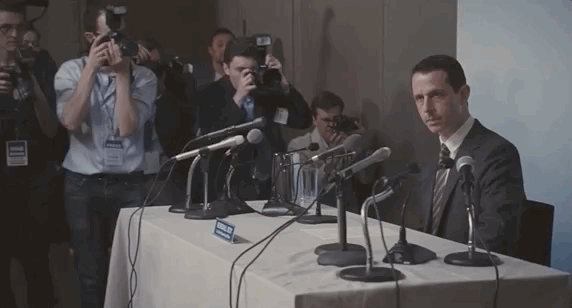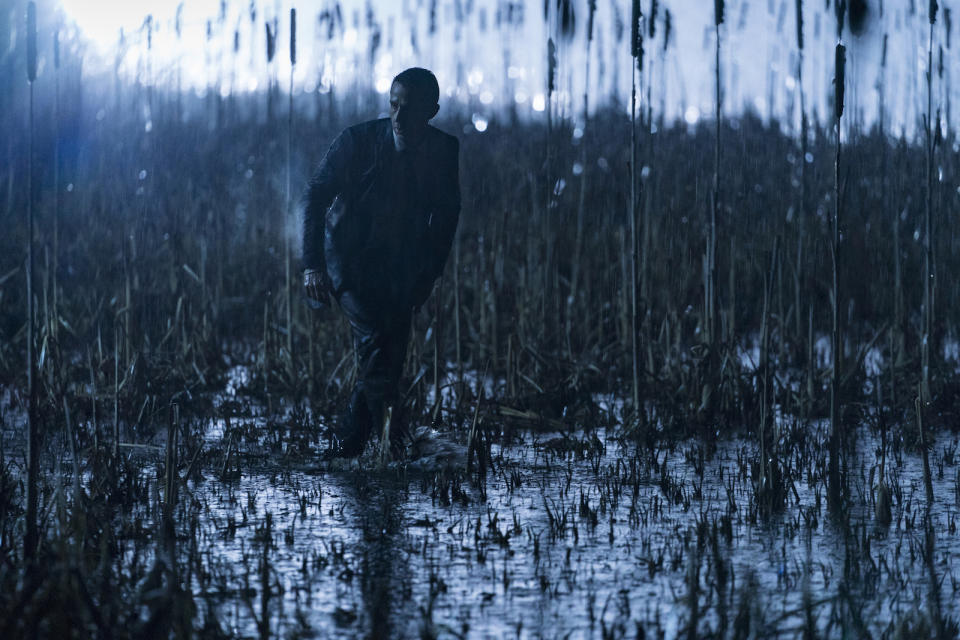‘Succession’ Star Jeremy Strong Breaks Down the Finale Scene That Changed Everything

[Editor’s Note: The following interview contains spoilers for “Succession” Season 2.]
In 2019, there was only one “but” that broke the internet and it belonged to Kendall Roy.
The crux of “Succession” Season 2 hinged on a single word, uttered by Jeremy Strong in the finale, during a speech delivered at a press conference which saw Logan Roy (Brian Cox), patriarch of the Roy family and head of the Waystar Royco empire, thrown neatly under the bus by his (second) eldest son.
The scene — in which Kendall is tasked with delivering a pre-written speech acting as a scapegoat for the wrongdoings of an entire corporation, only to flip the script at the last moment — is electrifying and among the best moments the series has produced so far. And in it, Strong shines, essentially monologuing to a room full of reporters and yet, as is so often the case for Kendall, utterly alone.
In a recent interview with IndieWire, Strong walked us through his process, from learning of a season’s arc to seeing the final product on screen, all while chasing that pure acting high of perfectly delivering a moment for your character.
Our lightly edited conversation with the actor is below.
IndieWire: Where and how does the process begin for you? Is it when you first encounter a script?
Strong: Well, I would say it begins before there’s actually a script. It begins with knowing the overall arc of the season.
So, I know that [this scene] is the final note that the different movements of the season close on. And then it’s a matter of burying that knowledge and unlocking the scene for myself in a way that feels inevitable and also a surprise for the audience.
But certainly this show has done a kind of magic trick in the finale of both seasons, where there is a really major turning point; a road to Damascus moment where there’s a profound and dramatic change of character. Those moments are the greatest thing as an actor to be given, and also the most difficult, I think, to fully realize because they have to both happen in the moment suddenly and at the same time. You have to thread that needle so precisely, and make sure that all of the Stations of the Cross have really been checked off on the way to get there.
At the table read, I remember thinking, “Oh, this scene will be a matter of one or two takes and it’ll just kind of be in the pocket because the writing will take care of me.” We built all of this scaffolding to get to this moment and all I have to do is walk in the room and give the press conference. And then it turned out to be much more difficult than that on that day.
I guess what I really mean is that 95 percent of the work of that scene is in preparing the ground for it in the course of the season leading up to it, so that when I walked through that door, it felt like a fait accompli for me.
Rewatching the scene before this interview, it plays in concert with how I felt the first time I watched it. Originally, I looked at Kendall and he seemed, for all intents and purposes, as though he was walking to the gallows. On revisiting the scene, even knowing what’s about to happen, there’s still a sense of ambiguity. In that moment, how do you find the balance between what you, Jeremy, knows, what Kendall knows, and what the audience knows?
What I love about your question is, it speaks in a lot of ways to the mysteries of acting. There’s this idea that as an actor, you should have this perfect clarity and understanding, in a way that we are denied in our own lives. I think often in our lives that ambiguity exists in those moments of greatest resolve. And so I think I allowed a certain amount of it to remain opaque to me. I think the moment I stepped off the plane and walked down that gangplank […] I was walking with the singularity of mission and a sniper’s aim. That felt quite clear.
At the same time, the season starts out with me saying to Shiv, “It won’t be me.” And in that moment, I fully mean that and I cannot see a world where I turned the tables against my father at the end. I can only see a world where I go to the gallows in penitence, to pay for my crimes. In a sense, I’ve given up on myself and given up the fight. Finding the fight again in the scene with my father on the yacht when he says to me, “You’re not a killer,” and when he says, “No real person involved,” and I understand the dial turns in terms of understanding the callous inhumanity and brutality of my father. It’s that revealing.
I’ve said this before, but it’s not news to me that [Logan’s] a monster. It’s not news to me that he is a ruthless person. But in that moment when he says, “No real person involved” so flippantly, I perceive something in him that I don’t think I’ve seen before, which is an abyss. There’s something irredeemably evil about that. In that moment, there’s a sort of Houdini moment for me, where I’ve been in chains and I’ve been underwater and I’ve been all of the things that have been used to describe the character, which to me, just felt like I was a dead man walking through the whole season.
All of a sudden, I’m liberated from all of that and I see with preternatural clarity what I’m going to do. But until that moment I was certainly ready to go and make a sacrifice of myself because I felt like I deserved it. So when you say that you still see ambiguity, I guess there are still moments, despite his resolve, of feeling a sense of, “Maybe I should do this. Maybe I should pay for my crimes. Maybe I am going to read this letter that they’ve prepared for me.”
Right.
At a certain point, as the actor, I decided I was going to make up my mind in the middle of the scene and maybe we would see the character’s mind change in that moment of the press conference. I never decided how I was going to play the scene. Something I really believe in is not proscribing any answers. If you have loaded yourself up with enough understanding of the character’s struggle and need and dilemma, then your job is to work through the knot of that dilemma in real time, on camera, in front of the audience.
There’s this myth that actors have to make choices. I guess I feel like choices are made for you by your instincts in the moment. That scene ended up being really tough for me because I thought it was going to be very straightforward and easy. Instead, it just wasn’t flowing and I don’t know why. I’m one of those actors where performance is not a monolith, it’s thousands and thousands and thousands of hours of imperfect attempts at a scene and each take is a search.
I think sometimes something opens up to you within a take and you follow that line of intuition and sometimes the doors are all closed to you. Matthew McConaughey just wrote a book called “Greenlights” and I was thinking about that idea. You expect a take sometimes to be a bunch of green lights and things are just clicking in and you kind of catch a wave. I remember that day, I walked into the first take — I don’t like to rehearse, and I like to create the dynamic in the environment as much as possible. So they had filled up the room with the press and I walked in and I sat down and I started the take and the microphones weren’t live. They were prop microphones. And it really, really threw me in a way that I wasn’t prepared for. I assumed the environment would just be real.
We tried to fix that a few times and there was some difficulty figuring out how to fix it and then there was a single speaker in the back of the room and it didn’t sound as if I was speaking into a microphone to the room. Anyway, I became conscious of that in a way that you don’t ever want your mind to be awake in that way. You need to put it on airplane mode. And it took me a while to get back from it. […] So I felt this pressure in a sense that I was fumbling the ball, repeatedly.
I remember reading Dustin Hoffman talking about a scene in “Rain Man,” where it was really his own frustration with himself, his sense of impotence as an actor that boiled over into what then became the scene. I think my frustration with those issues sharpened something in me and put a bit of fire in my belly. At the same time, I knew that I had to once again start over with the humility of not knowing what should happen in the next take. I think it was around take nine or 10 that it was one of those green lights takes.

Part of it was, in the writing, there was no scissura. The word “but,” is in the middle of the speech and is the turning point and in terms of the way it was written, it was just one big run-on sentence. There was no pause before or after that word. Somehow, feeling obligated to that, I wasn’t finding it. There was a take where something in me just stopped before saying that word and then the turn sort of happened by itself. That took me to the end and I tore up the paper in that take, which hadn’t been in the script and hadn’t happened until that point.
Sure.
It was just one of those times where things really came unbidden after a lot of wrestling with and searching imperfectly for the scene. And then I was sort of granted this one take that felt right to me. Then we were able to build from there and the microphones at that point were working. It’s such a small thing, but in terms of, for me, everything rests on believing utterly in the reality of the circumstances.
And then Jesse said, “I want the press to start asking you questions,” so we did some takes when they were throwing questions at me and I was answering them on the fly. We explored a lot of different ways the scene could potentially end.
Sometimes it’s a war of attrition against a scene that you have to chip away at it and chip away at it before it reveals itself to you.
It does feel like a scene that, like you said, needs that tension.
Another challenge is always, when you have a lot of background artists who are meant to hear things for the first time. You can tell when the tension has gone out of the room and so you have to muddy the waters a bit so that all of a sudden, they’re listening again and they don’t know what the next word that might come out of your mouth is, even if they’ve heard it before.
So bringing that alive is a challenge. Keeping them on their toes, as well as for yourself, keeping yourself on thin ice somehow, so that it doesn’t feel like you’re performing a scene, especially in a moment like that, that act of defiance. There’s a Wallace Stevens poem where he says, “After the final no there comes a yes. And on that yes the future world depends.” I felt like that scene had the weight of that line in it. It was like everything was resting on this fulcrum point, but the fulcrum point couldn’t just be spoken, it had to be experienced.
Right. I assume that’s difficult in scenes like this, where you’re almost channeling the energy of a live audience, that in reality has been sitting through those takes with you.
The magic of it always being for the first time. A friend of mine worked on “Milk” with Sean Penn and there’s that incredible scene where he was giving a speech outside of City Hall. I think that was like, 12 hours of the same speech, but finding it each time anew, and that is really the challenge and also the joy. There is, for me, an inexhaustible energy in the search. Perfectionism is the enemy, but I think you know when you haven’t found something yet. And so there is a dogged and relentless search for things to coalesce in a way that feels true.

Are there scenes from which you walk away and you’re like, “Yeah, that was close”?
It’s rare. I would say in the finale of the first season, the way that scene played out on the day completely took me over. It was incredibly cathartic and also traumatic. That experience was real and it was unexpected and I don’t know where it came from. Every once in a very long while, I think you feel like you touch on something where you understand what acting can be. It’s rare, but it’s those moments that keep you going.
I have to imagine it’s a little easier to hit those when there aren’t so many moving parts. When you aren’t dealing with microphones and background artists, so as difficult as I know the final scene in Season 1 was, it makes sense that maybe you might feel more in sync with its rhythms.
I think that’s possible. Also, that scene dramatically, in terms of the exchange between my father and I, you are mostly responding to something that’s happening to you. I think if you do your work right and you put yourself in the trouble that the character is in, filled up with the need to somehow get out of that trouble, then you can just enter into the scene and fight for what the character is fighting for.
As opposed to the press conference scene.
This scene was surprising because it lacked traction. I’m simply, in a sense, making a speech. There’s no scene partner. And so the scene partner, in a way, is Kendall’s entire history inside himself. The internal turmoil, his father’s voice, that he’s internalized, that has held him down and disempowered him for his whole life. So finding his own power, which in a sense is also about you as the actor finding your power.
I think Kendall often feels underwater. Of course, it makes sense to me that the scene that is meant to be this hundred yard dash down an open, clear field into the end zone, doesn’t play out that way. Instead, there are a million things trying to trip me and tackle me and take me down. I guess what I’m getting at is my experience of that scene is what ends up being Kendall’s experience of that scene.
When I lingered on that word, “but,” I felt as if… you remember in “Backdraft,” there’s this amazing moment when the smoke gets sucked back into the house, it was as if in that breath, in that pause, something else suddenly filled up my lungs and filled up inside that had not previously been there. That’s how it was with my power, with the character’s power, he seizes it in that moment, he reaches out and grabs it.
There’s a moment in “Crime and Punishment” where Raskolnikov is thinking about killing this woman and eventually he gets to a point where he does it because he realizes it’s about daring to do something, daring to seize something. And so it’s transgressive and it’s dangerous, but it is about seizing something in that moment. It’s obviously not a murder, but symbolically, it is. It’s finally that sense of, “Kill your idols.”
I don’t think the camera is on me in that moment, but I remember looking into the eye of the television camera that was shooting me. I was speaking directly to my father for that whole scene, but precisely in that moment, and in a sense, sticking the knife in. While at the same time embracing him, because it’s an act of defiance and ruthlessness that he’s been trying to engender in me for my whole life. There’s still a sense of, “Look at me, Pop. Aren’t you proud of me? Do you love me now?” because this kind of violence and abuse is the way in which we connect.
“Succession” is streaming now on HBO Max.
More from IndieWire
'The Morning Show' Finale: How Mimi Leder Guided a Tricky Ending to That Final Shot
'Euphoria': The Musical Magic That Came from Following What Felt Just Right
Best of IndieWire
Sign up for Indiewire's Newsletter. For the latest news, follow us on Facebook, Twitter, and Instagram.


